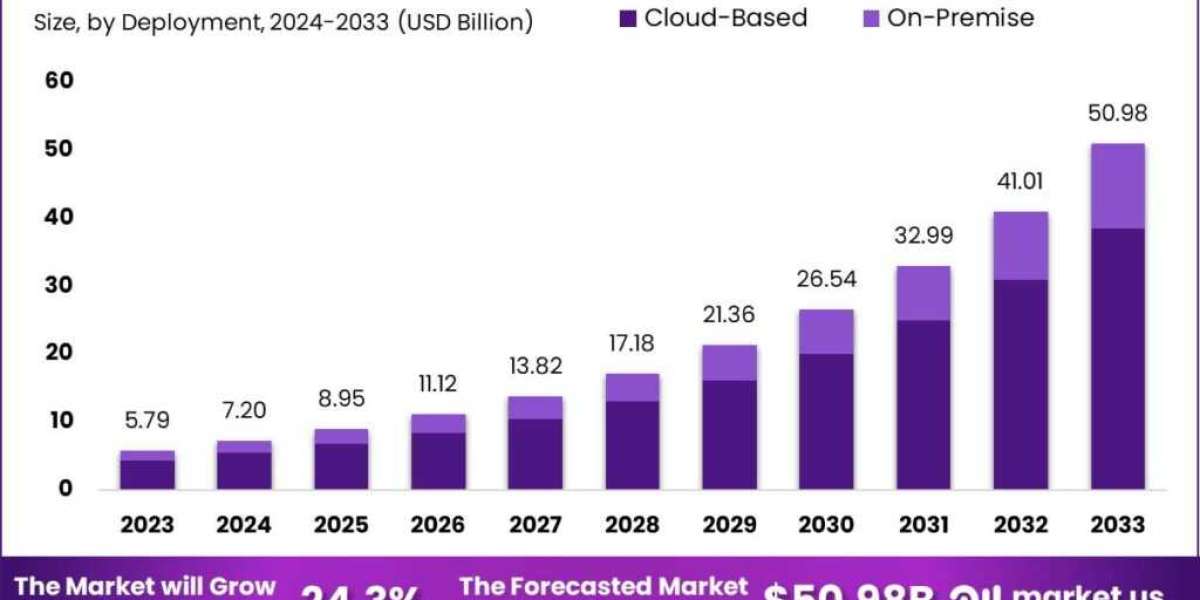AI in the ecommerce market is transforming the way businesses interact with customers and manage operations. Artificial Intelligence (AI) encompasses a range of technologies that enable systems to learn from data, make decisions, and improve over time without human intervention. In ecommerce, AI is revolutionizing various aspects, from customer service to supply chain management, offering businesses powerful tools to enhance efficiency and personalize shopping experiences. As the digital landscape evolves, AI is becoming a cornerstone in the quest for better user engagement and operational excellence in online retail.The Global AI In Ecommerce Market size is expected to be worth around USD 50.98 Billion by 2033, from USD 5.79 Billion in 2023, growing at a CAGR of 24.3% during the forecast period from 2024 to 2033.
Major Drivers
Several key factors are driving the adoption of AI in the ecommerce market. First, there is an increasing demand for personalized shopping experiences, as customers expect tailored recommendations and content. AI enables this by analyzing vast amounts of data to predict preferences and deliver customized suggestions. Second, the rise of big data analytics allows ecommerce businesses to glean actionable insights from customer behavior, improving decision-making and marketing strategies. Additionally, AI-powered chatbots and virtual assistants are addressing the need for 24/7 customer service, providing instant responses and support.
Read More @https://market.us/report/ai-in-ecommerce-market/
Emerging Trends
One prominent trend is the integration of AI with augmented reality (AR) to enhance the online shopping experience. AR allows customers to visualize products in their own environment, such as trying on clothes virtually or seeing how furniture fits in a room. Another trend is the use of AI for dynamic pricing, where algorithms adjust prices based on market conditions, competitor pricing, and customer demand in real-time. Additionally, AI is increasingly being used for fraud detection, helping to identify and prevent fraudulent transactions before they occur.
Top Use Cases
AI is being applied in several impactful ways within the ecommerce sector. Personalization engines use AI to recommend products based on browsing history, purchase behavior, and demographic information, which can significantly increase conversion rates. Chatbots and virtual assistants handle customer inquiries and process orders, improving efficiency and customer satisfaction. AI is also used for inventory management, predicting stock levels, and optimizing supply chains by forecasting demand and automating restocking processes.
Challenges
Despite its advantages, implementing AI in ecommerce comes with challenges. High initial costs for AI technology and integration can be a barrier, particularly for smaller businesses. There are also concerns about data privacy and security, as AI systems require access to large amounts of customer data. Additionally, the effectiveness of AI depends on the quality of data it receives; poor or biased data can lead to inaccurate recommendations and insights. Companies must also address the potential for job displacement as AI takes over tasks traditionally performed by humans.
Opportunities
The opportunities for AI in ecommerce are vast. Enhanced personalization can drive customer loyalty and increase sales, as tailored experiences lead to higher satisfaction and repeat purchases. AI-powered analytics offer deeper insights into consumer behavior, enabling more effective marketing strategies and inventory management. There is also potential for AI to innovate in customer service with advanced conversational interfaces and support systems. As technology evolves, further advancements in AI could lead to even more sophisticated applications, driving growth and efficiency in ecommerce.
Conclusion
In conclusion, AI is rapidly becoming an essential component of the ecommerce market, offering significant benefits in personalization, efficiency, and customer engagement. While there are challenges related to cost, data security, and implementation, the opportunities presented by AI are considerable. By leveraging AI technologies, ecommerce businesses can enhance their operations, provide exceptional customer experiences, and stay competitive in a rapidly changing market. As AI continues to advance, its role in ecommerce is likely to expand, shaping the future of online retail.

